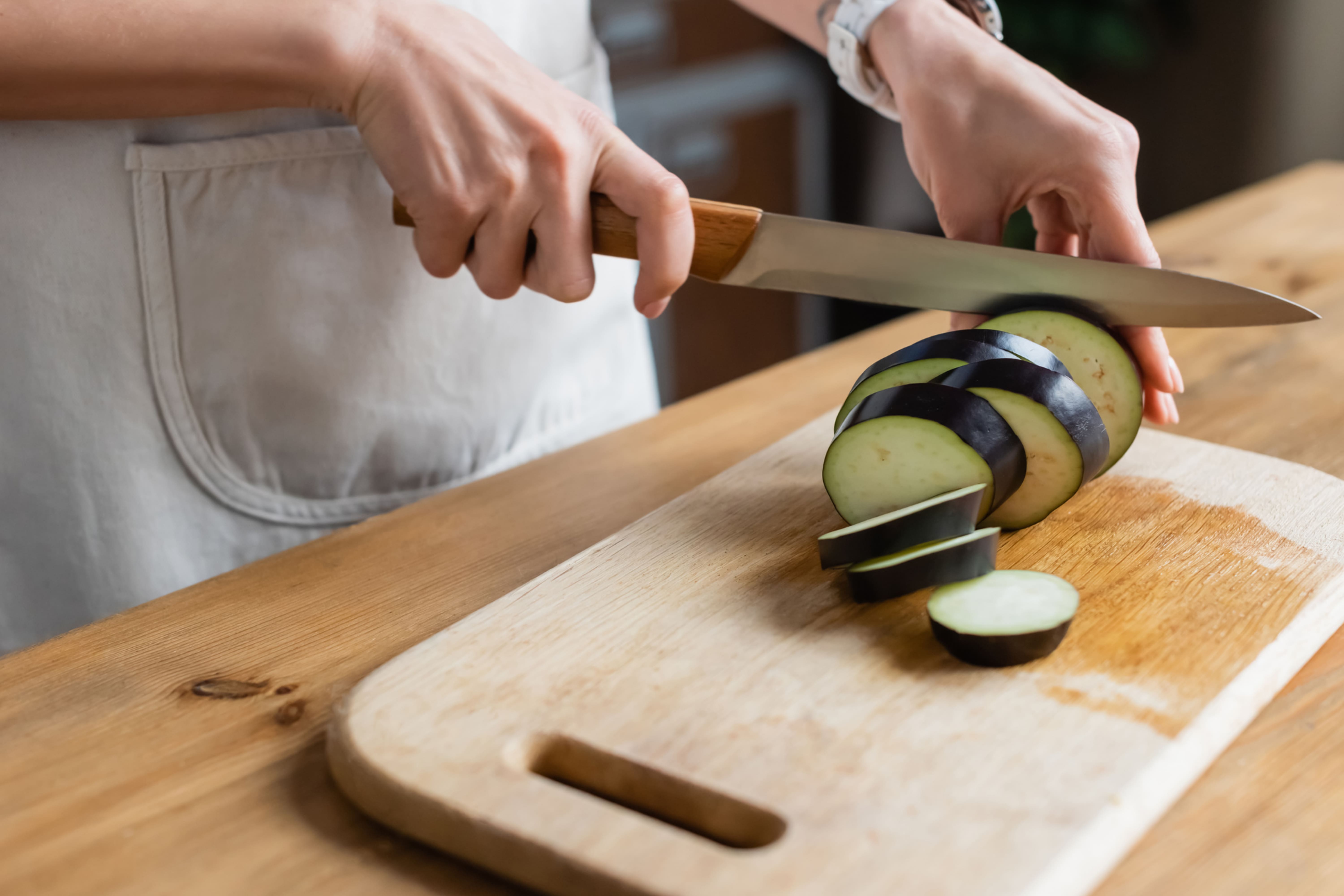Eggplant is extremely useful as it contains a huge set of vitamins, minerals, and trace elements. It has many beneficial substances that contribute to the elimination of bad cholesterol, so it is called a good substitute for heart medicines.
But by its nature, eggplant is extremely sensitive to crisp storage conditions.
Should eggplant be refrigerated and how to store it properly? Read this article and learn the responses to these questions.
How to Choose Eggplants for Storage?
The main secret to keeping the eggplants crisp for as long as possible is to carefully select them. Only very young plants of rich deep purple color are suitable for long-time keeping. They have a smooth, elastic and shiny skin without damage. Pick up the heaviest eggplants of the same size.
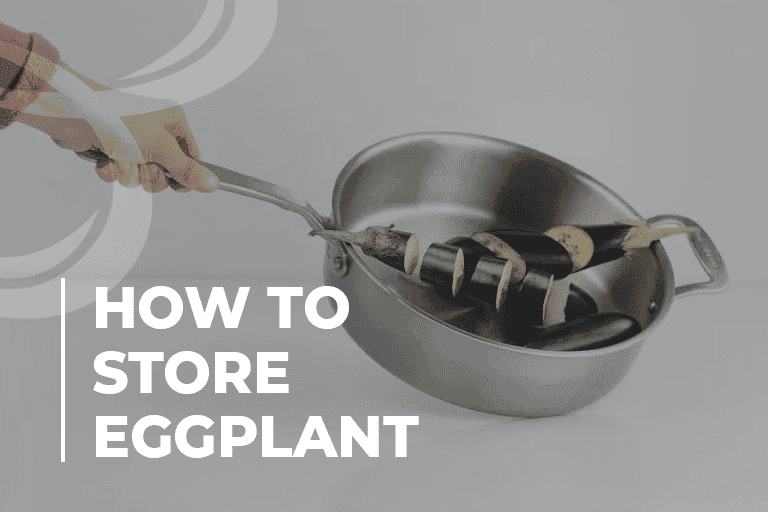
Check if you can leave a dent with a finger. If yes, it means that the eggplant is overripe.
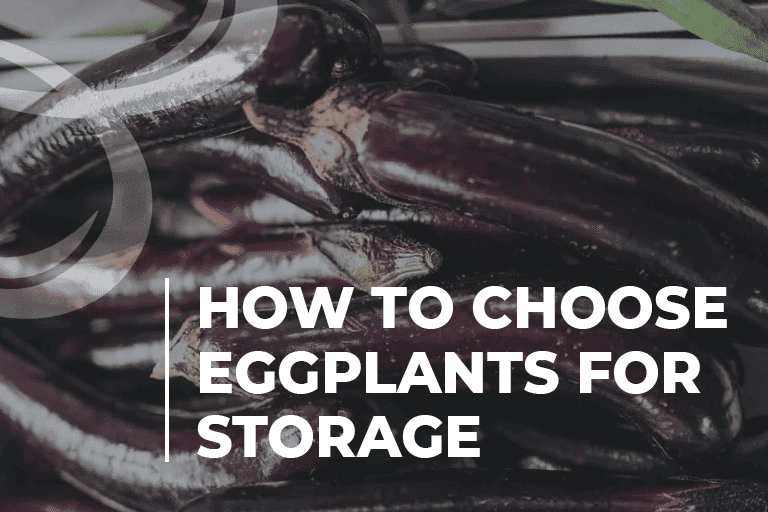
If you are growing eggplants on your own, plant late-ripening varieties for extended keeping.
Harvest before the frost, cutting the fruit with a knife along with the stem. It is not advisable to rinse the collected eggplants, it is enough to wipe them dry with a clean cloth.
Storing Fresh Eggplant
There are different ways to store eggplants:
- you can just pack the fruit in a packet and leave it in a heatless place in the apartment (they get spoiled faster in the refrigerator);
- a small amount of eggplants is well kept wrapped in paper and neatly stacked in one layer in boxes;
- you may store eggplants in deep boxes covered with ash at a temperature of about +7 degrees;
- it is possible to leave the eggplants on the garden beds for a while if you lay the plants together with the fruitlets in heaps and cover with straw;
- store eggplant in a dark unheated room. Crisp aubergines are spread on a straw mat for fourteen days, then the they without damages are wrapped in paper and laid on a layer of straw up to 20 cm high and cover with a quilted cloth.
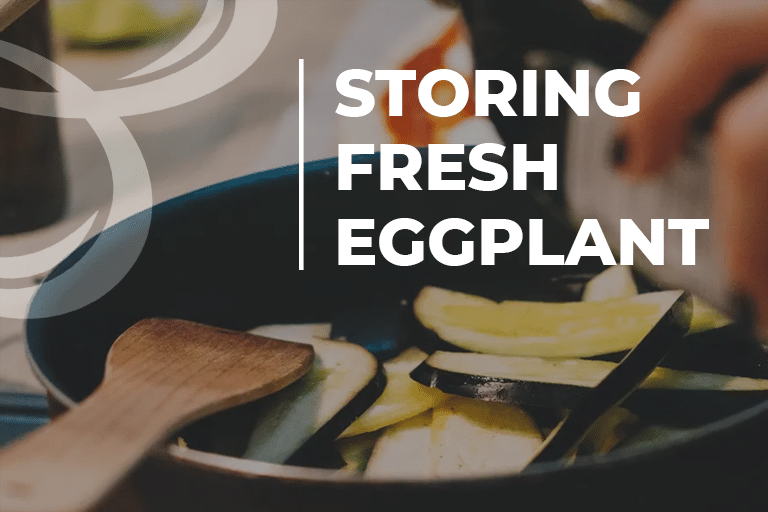
Do You Fridge-Chill Eggplant?
Eggplant is a foodstuff that has a special taste and absolutely no odor. But at the same time, it heavily absorbs the smells of the surrounding products. And if the freezing process is improper, it can completely lose its taste.
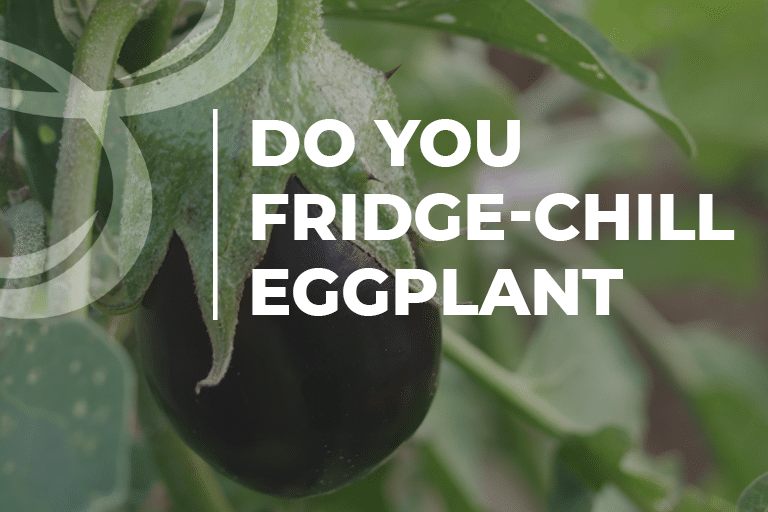
So should we refrigerate eggplant?
Definitely yes. Just imagine what a delicacy you will be able to enjoy in winter.
But before freezing, the vegetables must be well prepared. There are four options for freezing crisp eggplants.
They can be:
- soaked
- blanched
- fried
- baked
Eggplant Shelf Life
How long does eggplant last?
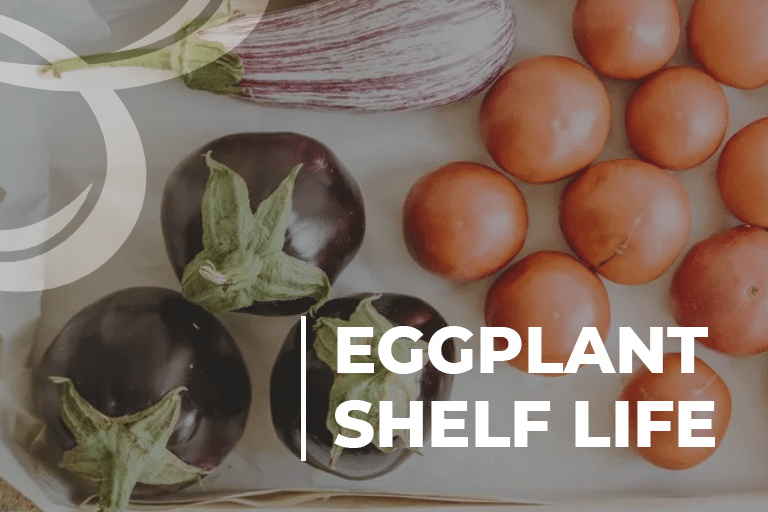
Roughly the time periods are as follows:
- frozen eggplants are kept for several months;
- at 2 points, the eggplants are kept for an average of one month;
- at points of 10 and above, the eggplants can remain crisp for several noons (maximum 5-6 days);
- at the amount up to 7 points, the eggplants retain freshness and juiciness for several dozens of days, but it is recommended to cover them with ashes, sand, or wood sawdust.
Optimal Storage Conditions for Eggplants
You will keep raw aubergines longer if you store them in the cold pantry:
- a dark spot without light access;
- the surroundings should not exceed +2 – + 4 points;
- recommended humidity is 75-90%.
Eggplant Freezing Tips
Whatever way you freeze raw aubergine, remember that in any case, you should start by soaking the veggies in saltwater. If you do not do it, their flesh will become too elastic. Besides, in this way you will remove the bitterness of the fruit;
Before you send the eggplants in the freezer, they must be wrapped with a food film or packet. When wrapping, make sure there is no air inside, otherwise, it can lead to oxidation;
Lay the eggplants on paper towels before packing. This is done to get the extra oil out and let the eggplants dry out after soaking;
Frozen fruits should be stored for a maximum of 6 months.
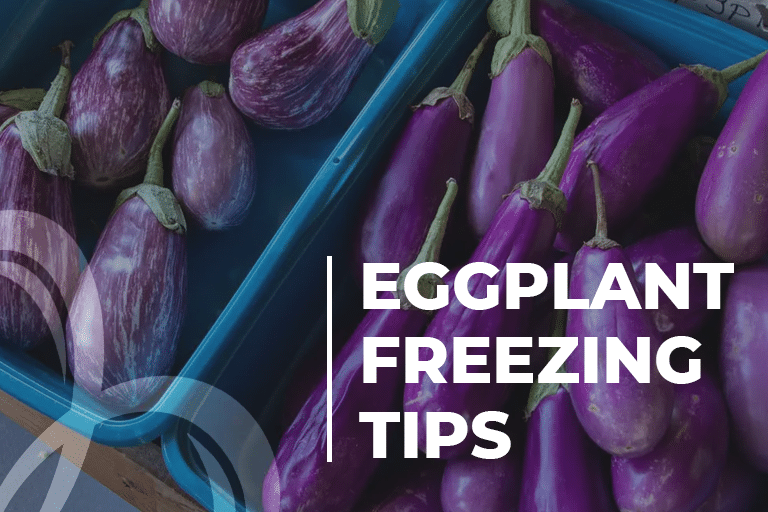
How to Keep Chopped Aubergine?
If you want to freeze the fruits in chopped pieces, you need to bake them. The recipe is very simple.
- Choose medium-sized eggplants. Wash them well and slice them. It is most convenient to do it into circles or cubes;
- Before baking, veggies should be kept in salt to remove the bitter taste. To do this, lay the sliced eggplants in a deep bowl and pour them with salt. Leave them for an hour or two, then rinse them under running water and squeeze well;
- Spread some baking paper on the baking dish and carefully grease it with vegetable oil;
- Carefully spread the fruit and send it to bake. They should bake at a setting of no more than 180 degrees for about 40-50 minutes;
- Transfer the baked vegs to paper towels and give them time to chill down;
- After it, distribute them in packages and remove them in the freezer.

How to Dry Eggplant?
You can dehydrate the eggplants to save them until the next harvest. To do this, use the same method as when drying mushrooms:
- The eggplants are washed, the stalks are chopped off;
- The fruits are divided into slices 0.5 cm thick;
- Attach the slices on a string of string;
- Chopped eggplants are placed in a moistless, well-ventilated area, such as in the attic, or outside in the shade. They should not be exposed to daylight. Drying lasts 2-3 weeks. After it, store eggplant in a linen bag or in a sealed jar. Store in a chilled moistless spot.
- To speed up the process, the eggplants can be dried in a rotisserie or an electric dryer. It will take 5-6 hours for thin slices to dehydrate at a temperature of 50-60 ° t.
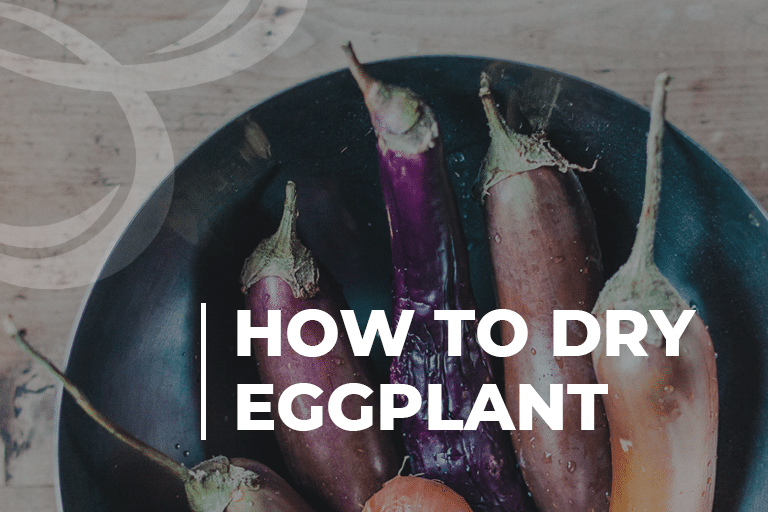
All of these crisp storing aubergine options do not guarantee that the fruits will not spoil and retain their elasticity until next season.
Remember, that eggplants are the least suitable vegetables for extended keeping. Well, you may try to dehydrate the eggplants for the winter or bake a little in the oven and freeze (raw eggplants do not taste good after freezing).
In this form, the fruits can be used for cooking at any time of the season and the taste will be as if the eggplants were just picked in the garden.
Frequently Asked Questions
Eggplant is healthy veg that can be used for cooking many delicious dishes. However, sometimes it suddenly gets rotten! How to avoid spoiling the vegetable and keep it last longer? Read our answers below.
Can You Store Eggplant In the Fridge?
Yes, eggplants can be stored in the fridge. Actually, this is a tricky vegetable to store because, when being kept outside the fridge, it can last for two days only. So, if don’t plan to use it within the two days after you bought it, store it in the drawer section being wrapped in a paper towel and put into the perforated plastic bag. Like that, your eggplant will survive from seven days and up to two weeks.
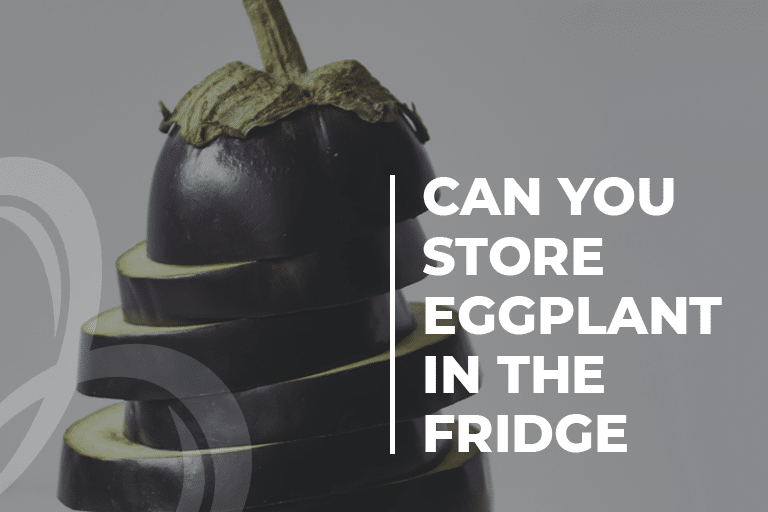
Can You Store Eggplant In the Freezer?
If you have many eggplants or simply want to use them much later, you can keep them in the freezer. To do that, blanch or steam the vegs, and you will be able to keep them for up to half a year!
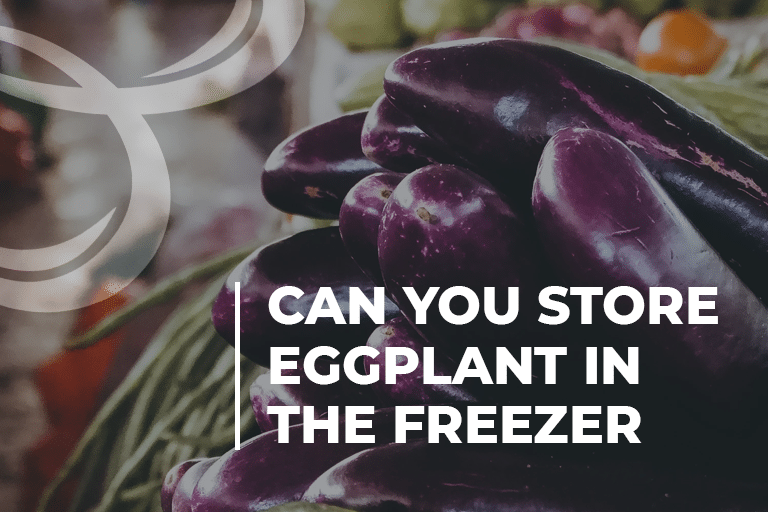
Can You Keep Chopped Aubergine?
What if you have some cut eggplant left and wonder whether it’s possible to keep it? Toss its slices into a glass container and add some lemon juice to cover the slices. Make sure they are not floating in it, though! Two tablespoons per one middle-size eggplant will be enough.
Close the container with the lid tightly and shake it accurately. It will help to keep the vegetable for two or three days.
Can I Store Fresh Eggplant In the Fridge?
Yes, you can. For that, wrap the vegetable with a piece of paper or a paper towel and put it into the perforated plastic bag. Any reusable container will do well, too. Avoid keeping it uncovered together with apples and some other fruit is it will turn bad faster.
Store your eggplants like that in a crisper section, and they will last for up to 14 days.
Where Should You Store Eggplant?
Even though your fridge is a convenient spot for storage, it’s not the best option for eggplants though. Surprisingly, eggplants are stored better at room temperature (not lower than 50 degrees Fahrenheit) in a cool place. Make sure they are away from sunlight and don’t keep them in a plastic bag as it will faster their ruination. Also, keep them away from apples, bananas, tomatoes, and melons because those vegetables make eggplants get rotten faster.

How to Store Eggplant for Future Use?
If you want to make your eggplants last as long as possible, better freeze them. Take your eggplants, peel them and slice. Boil some water with lemon juice (half a cup of juice per each gallon of water) and cook eggplants in it for 5 minutes. Take them out of boiling water and immerse for 5 minutes into cold water instead, too.
Drain eggplants and pack them into a vacuum bag or a zipped bag removing the air from it first. Now you can toss them to the freezer.
How to Store Eggplant After Picking?
To keep eggplant crisp, store it in a cool place away from the sum shine at room temperature. Also, make sure there are no apples, bananas or melons nearby as they will make eggplants turn bad faster.
How to Stop Eggplants From Getting Brown
This is a common tragedy for any kitchen: you open the fridge, take out a glossy aubergine, cut it, and…oh, no! It’s all brown inside! Or another scenario: you have cut the veg before and tossed the leftovers to refrigerate, but they became dark one day.
Why does it happen? Are they still safe to eat? Why do eggplants produce that brownness at all? All these questions start quickly roaming in our heads. Of course, nobody wants their food to spoil too fast, that is why we can give you a piece of good advice on how to learn to keep the aubergines crisp longer.

First of all, you need to remember that the brown shade the veggies produce is not a sign of the food spoilage. If the veg is kept already chopped, it only shows that its flesh was in contact with the air too much. Maybe, the bags you keep it in are not sealed properly. Or, perhaps, the skin is damaged.
Anyway, if the brownness looks like small pots around the seeds, there is nothing to worry about. But if the whole flesh is dark, our advice is to discard the veg since it’s not about badly sealed bags or something – the aubergine is rotten.
So how do we protect our food from that sad destiny? Choose one of the following recipes.
- Before cutting the veg, prepare a bowl of water and mix in a spoonful of milk. Once you cut the aubergine, immerse the pieces into that blend, and they won’t produce black!
- If you have no milk right now in the kitchen, go for a lemon. Add a dash of this citrus into the water, and submerge the freshly cut plant into this liquid. The contact with acidic water will protect the aubergine from turning dark.
These recipes are super simple and what is even better, they work!
How to Eat Eggplant. Simplest Recipes to Try
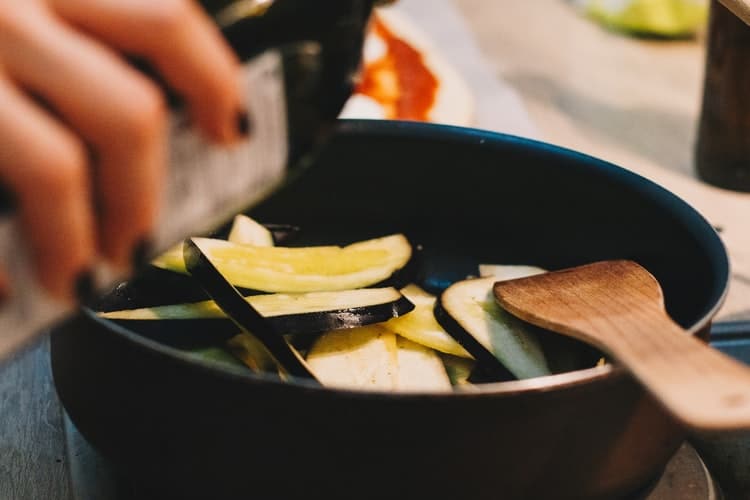
Everyone likes to eat delicious food but since most of the recipes are quite time-consuming, we just feel lazy to even start. Preparing aubergines is not an exception as these veggies need time unlike broccoli or zucchini. Fortunately, we collected several quickly recipes of various dishes that will add more healthy food to your tables!
1. Eggplant tart
It’s not sweet but still it is incredibly tasty! This is a perfect food for a weekend lunch, garden party, and lots of other family occasions. Be creative and add some broccoli to make it look more colorful.
2. Roasted eggplant
Not simply roasted but marinated in miso and generously sprinkled with sesame seeds. One of the easiest recipes we ever seen
3. Eggplant&chicken pizza
Who likes pizza? Everyone does! This one, with juicy aubergine, poultry, and broccoli is a perfect food for a quick snack.
4. Mint yogurt aubergine
Sliced aubergine fried to the crispy crust with the skin, paired with refreshing minty dip will tickle your tongue! Probably, one of the most unusual recipes.
Note: for the yogurt dip, buy mint jelly and mix it in a plain unsweetened yogurt.
5. Greek burgers
For this recipe, you can either buy burger cutlets or make them yourself – it doesn’t matter. Toasted buns with leafy salad, grilled aubergine and meat – a great option for barbeque.
6. Eggplant Pasta salad
Boil pasta, add cooked vegetables (broccoli, carrots, peas – whatever you want), mix in roasted aubergine, and give it a final touch with olive oil and herbs.
These are not all the recipes that exist, of course. But you can create your own and experiment! Buy different ingredients, mix various spices and components – who knows, maybe you’ll create a masterpiece?

